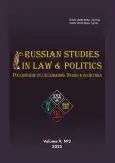State and legal bases of investigation of minors in the Russian Federation (procedural aspect)
- Authors: Timerbayeva A.R.1,2, Zaripov S.R.2, Aslaev S.T.2, Aslaev T.S.2, Ogurechnikov D.G.2, Prokofieva D.D.2
-
Affiliations:
- Investigative Department of the Ministry of Internal Affairs of the Russian Federation for the Ufa district
- Ufa University of Science and Technology
- Issue: Vol 9, No 2 (2025)
- Pages: 20-40
- Section: Статьи
- Published: 30.06.2025
- URL: https://journal-vniispk.ru/2576-9634/article/view/301161
- DOI: https://doi.org/10.12731/2576-9634-2025-9-2-229
- EDN: https://elibrary.ru/NNQFOU
- ID: 301161
Cite item
Full Text
Abstract
The relevance of the study lies in the need to develop effective tactics for examining minors due to the increasing number of crimes against children and adolescents, as well as the peculiarities of the physiological and psychological development of this category of persons. The effectiveness of state measures in law enforcement activities depends on compliance with legal procedures and the protection of the rights of minor participants in criminal proceedings. The authors have identified the problem of the place of examination in the system of criminalistic tactics in criminal procedure and doctrinal aspects. The main research method is an analytical review, which includes the systematic collection of information, its analysis and interpretation from various sources. The purpose of the study is to develop optimal tactics for conducting an examination of minors that meets the requirements of the legislation of the Russian Federation. The result of the study is the development of recommendations on the tactics of conducting an examination of minors, including optimal algorithms for the interaction of medical professionals and law enforcement officials, the procedure for informing parents or legal representatives, and compliance with the principles of humanism and justice. The key conclusion of the study is the thesis that when conducting an examination of minors, the general provisions of the inspection tactics are applied. The investigator, taking into account the personality of the special subject, must make decisions to conduct an examination that does not violate the underage's unformed psyche.
Keywords
About the authors
Adelina R. Timerbayeva
Investigative Department of the Ministry of Internal Affairs of the Russian Federation for the Ufa district; Ufa University of Science and Technology
Author for correspondence.
Email: Timerbaevaadelina@gmail.com
Investigator, Bachelor of Law
Russian Federation, 131, Dostoevsky Str., Ufa, Republic of Bashkortostan, 450005, Russian FederationShamil R. Zaripov
Ufa University of Science and Technology
Email: zaripovshamilrishatovich@mail.ru
lawyer, Assistant Professor, Department of Financial and Administrative Law
Russian Federation, 131, Dostoevsky Str., Ufa, Republic of Bashkortostan, 450005, Russian FederationSagit T. Aslaev
Ufa University of Science and Technology
Email: kafedrafvbgu@yandex.ru
Candidate of Pedagogical Sciences, Professor, Advisor to the Rector
Russian Federation, 131, Dostoevsky Str., Ufa, Republic of Bashkortostan, 450005, Russian FederationTimur S. Aslaev
Ufa University of Science and Technology
Email: kafedrafvbgu@yandex.ru
Associate Professor, Department of Physical Culture, Institute of Nature and Man
Russian Federation, 131, Dostoevsky Str., Ufa, Republic of Bashkortostan, 450005, Russian FederationDenis G. Ogurechnikov
Ufa University of Science and Technology
Email: kafedrafvbgu@yandex.ru
Associate Professor of the Department of Physical Culture, Institute of Nature and Man
Russian Federation, 131, Dostoevsky Str., Ufa, Republic of Bashkortostan, 450005, Russian FederationDinara D. Prokofieva
Ufa University of Science and Technology
Email: kafedrafvbgu@yandex.ru
Senior Lecturer, Department of Physical Culture, Institute of Nature and Man
Russian Federation, 131, Dostoevsky Str., Ufa, Republic of Bashkortostan, 450005, Russian FederationReferences
- Averyanova, T. V., Belkin, R. S., Korukhov, Yu. G., & Rossinskaya, E. R. (2004). Forensic Science: Textbook for Higher Education Institutions. Moscow: Norma - Infra-M. 990 p.
- Anesheva, A. T. (2020). Algorithm of investigator's actions at the preparatory stage of examination. In Proceedings of the XXV International Scientific and Practical Conference "Law Enforcement Activities in Modern Conditions" (pp. 218–221). Irkutsk: East Siberian Institute of the Ministry of Internal Affairs of the Russian Federation. EDN: https://elibrary.ru/USQWOK
- Anesheva, A. T., & Aksenova, L. Yu. (2021). Examination: essence and tasks. Criminal Justice, (17), 25–29. https://doi.org/10.17223/23088451/17/5 EDN: https://elibrary.ru/SAXROW
- Akhmedshin, R. L. (2016). On the tactics of examination. Bulletin of Tomsk State University, (405), 154–161. https://doi.org/10.17223/15617793/405/22 EDN: https://elibrary.ru/VUSIFH
- Gorkina, E. V., Mitkova, Yu. S., & Kolbasina, E. E. (2022). Evidentiary potential of examination: imperfection of law and practice. Bulletin of the Volgograd Academy of the Ministry of Internal Affairs of Russia, (3), 57–63. https://doi.org/10.25724/VAMVD.A019 EDN: https://elibrary.ru/KUESRE
- Isaeva, L. M. (2003). Special Knowledge in Criminal Proceedings. Moscow: YURMIS. 304 p. ISBN: 5-93805-002-2 EDN: https://elibrary.ru/QXDJOT
- Lomakina, A. A. (2021). Features of the production of forensic examination and examination in the investigation of crimes against the sexual inviolability of minors. Bulletin of the Krasnodar University of the Ministry of Internal Affairs of Russia, (4), 20–26. EDN: https://elibrary.ru/AWDOVD
- Lomakina, A. A. (2018). On the issue of examination of a minor victim in the investigation of crimes against the sexual inviolability of the individual. Bulletin of the Krasnodar University of the Ministry of Internal Affairs of Russia, (1), 45–48. EDN: https://elibrary.ru/YVOFMF
- Min'kovskiy, G. M. (1956). Limits of Proof in Soviet Criminal Proceedings. Moscow: Gosyurizdat. 115 p.
- Popov, V. S. (2005). Participation of a defense attorney in the process of proof at the pre-trial investigation stage and in the court of first instance (Abstract of PhD Dissertation in Law). Chelyabinsk. 28 p. EDN: https://elibrary.ru/NIJZVX
- Potapova, A. G. (2007). Examination in the Criminal Proceedings of Russia: Procedural Aspect (Abstract of PhD Dissertation in Law). Chelyabinsk. 28 p. EDN: https://elibrary.ru/ZNFYNT
- Sidorov, D. A., & Lozovsky, D. N. (2023). Some aspects of examination of a minor. Humanitarian, Social and Economic Sciences, (5), 182–185. https://doi.org/10.23672/SAE.2023.10.45.003 EDN: https://elibrary.ru/TNFXJC
- Usachev, A. A. (2025). Criminal Procedure: Textbook for Higher Education Institutions. Moscow: Yurayt Publishing House. 468 p.
Supplementary files










